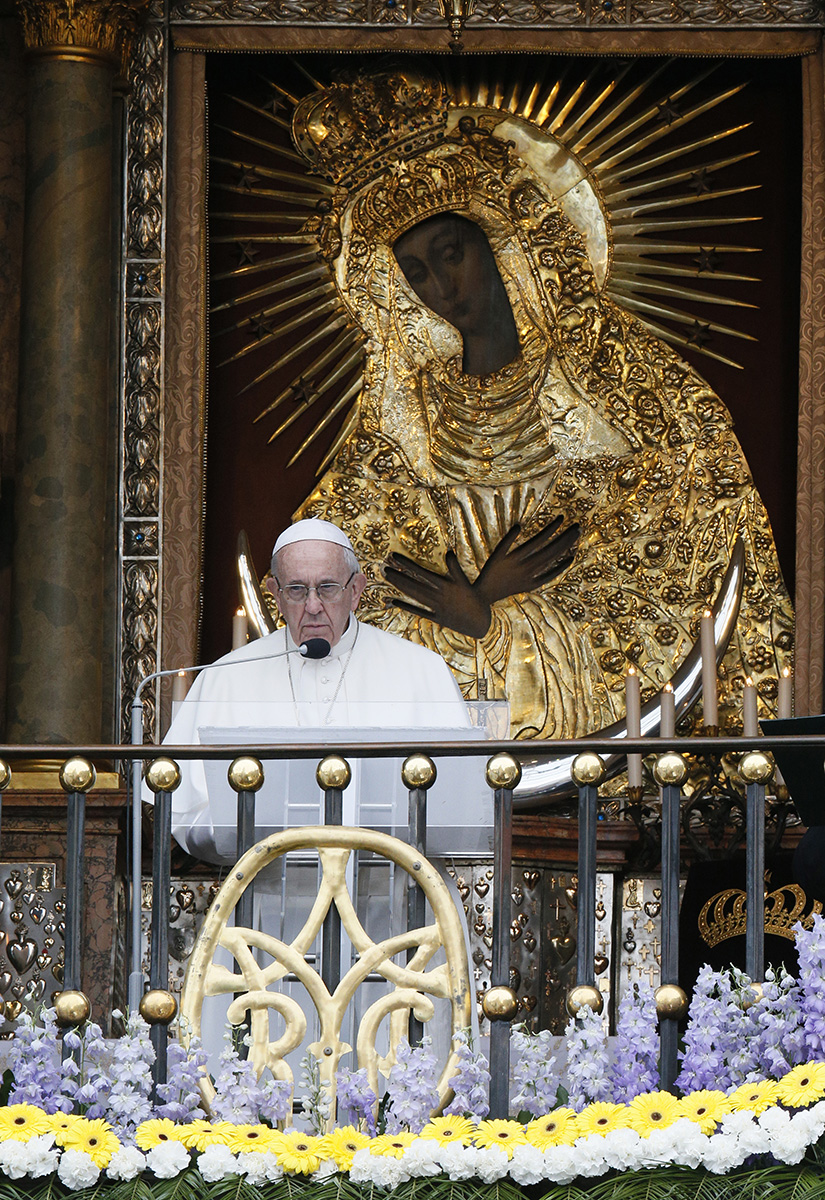VILNIUS, Lithuania — In Lithuania, a nation that experienced invasions, atrocities and persecution, Pope Francis began his visit with a plea to break down walls of suspicion and fear.
“If we look at the world scene in our time, more and more voices are sowing division and confrontation — often by exploiting insecurity or situations of conflict — and proclaiming that the only way possible to guarantee security and the continued existence of a culture is to try to eliminate, cancel or expel others,” the pope said Sept. 22.
He acknowledged Lithuania’s painful past, which included “numerous trials and sufferings: detentions, deportations and even martyrdom.” But he also praised the country’s culture and people for tenaciously resisting attacks on its freedom.
The pope’s visit Sept. 22-25 to Lithuania, Latvia and Estonia came in the year the three Baltic nations are celebrating the 100th anniversary of their declarations of independence after World War I. While declared Soviet republics in 1940, the countries were occupied by the Nazis during World War II and then lived under Soviet rule from 1944 to 1990.
Pope Francis, addressing national leaders, said that until the Nazis and Soviets arrived, people of a variety of national backgrounds and religions lived peacefully in Lithuania.
The “totalitarian ideologies,” though, “by sowing violence and lack of trust, undermined this ability to accept and harmonize differences,” he said. As Lithuanians consolidate their independence and democracy, they must return to the earlier cultural values of “tolerance, hospitality, respect and solidarity.”
Outside the former KGB headquarters — a former jail and execution site — in Vilnius, Pope Francis ended a day of paying homage to victims of totalitarianism and of warning Lithuanians to be attentive to any signs of anti-Semitism or hatred.
 Pope Francis prays as he visits the Shrine of Mary, Mother of God, in Vilnius, Lithuania, Sept. 22.Photo Credits: Paul Haring | CNSHe toured the museum with 79-year-old Archbishop Sigitas Tamkevicius, whose photo is featured prominently on a wall display honoring the priests and bishops who endured imprisonment in the building’s basement.
Pope Francis prays as he visits the Shrine of Mary, Mother of God, in Vilnius, Lithuania, Sept. 22.Photo Credits: Paul Haring | CNSHe toured the museum with 79-year-old Archbishop Sigitas Tamkevicius, whose photo is featured prominently on a wall display honoring the priests and bishops who endured imprisonment in the building’s basement.
The archbishop had been imprisoned from 1983 to 1988 for “anti-Soviet propaganda” for publishing an underground newsletter. St. John Paul II named him archbishop of Kaunas in 1996, and the archbishop retired in 2015.
Stay close to the suffering, forgive one another
AGLONA, Latvia — “What would Mary do?” Pope Francis asked the question to Latvian Catholics gathered at their nation’s popular Marian shrine.
Celebrating Mass Sept. 24 at the Basilica of the Assumption, a shrine holding a beloved icon of the Mother of God in Aglona, 60 miles from the Russian border, Pope Francis described Marian devotion as more than just pilgrimages; it means imitating Mary by staying close to the suffering, acknowledging injustice, forgiving offenses and promoting reconciliation.
After experienced 50 years of Soviet domination, Latvian remains fiercely proud of its re-conquered independence, members of Latvia’s large Russian minority have struggled to obtain citizenship rights, and many claim they still face discrimination. Russian speakers make up about a quarter of the population.
After an ecumenical meeting, Pope Francis went to the Catholic St. James Cathedral for prayer and a brief meeting with older men and women, who, the pope said, witnessed “the horror of war, then political repression, persecution and exile,” including to Siberia.
“Neither the Nazi regime nor the Soviet regime could extinguish the faith in your hearts,” Pope Francis told the elders, who fought and suffered for freedom.
At Mass at the Basilica, the pope said in the homily that Mary “stands near those who suffer, those from whom the world flees, including those who have been put on trial, condemned by all, deported.”
Being like Mary in closeness to the oppressed doesn’t mean “engaging in a kind of ‘tourism of solidarity,’” Pope Francis said. Instead, it means consoling people, helping them up and staying with them until they are steady on their feet.
“She begs that all of us may recommit ourselves to welcoming one another without discrimination,” he said.
Scandals create outrage, but
there is time for conversion
TALLINN, Estonia — In what is probably the least religious country in Europe, Pope Francis said he is surprised by how many people hold firm to their faith despite the sexual abuse and financial scandals in the Catholic Church.
“We know — as you have told us — that many young people do not ask anything of us because they do not believe we have anything meaningful to say about their lives,” the pope said Sept. 25 during an ecumenical meeting with young adults in Estonia.
But the Catholic Church wants to respond to young people and “wants to be a transparent, welcoming, honest, attractive, communicative, accessible, joyful and interactive community,” he said, adding that is a main aim of the Synod of Bishops on young people, which begins Oct. 3.
Still, he said, the amazing thing is that young people continue to find Jesus in the Church and through its members and ministers.
“We know that where Jesus is, there is always renewal,” the pope said. “There are always new opportunities for conversion and for leaving behind everything that separates us from Him and our brothers and sisters.”
“Beyond all our limitations and divisions, Jesus is still the reason for our being here.”
Pope Francis also met at the city’s Catholic cathedral with individuals and families assisted by Catholic charities and Catholic religious orders. The client shared their stories with the pope and told him how they found material help, faith and love.